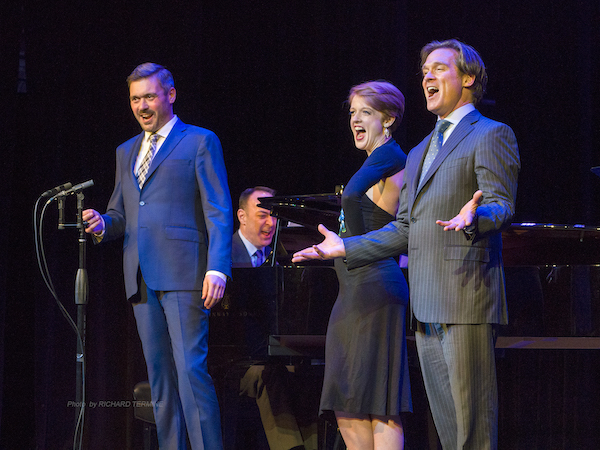A richly varied night of American song from Mirror Visions Ensemble

Mirror Visions Ensemble (singers Mischa Bouvier, Abigail Levis and Scott Murphree, and pianist Grant Wenaus) performed Sunday evening at the Sheen Center. Photo: Richard Termine
Mirror Visions Ensemble, now in its 27th season, continues to distinguish itself with intriguing programs of song, reflecting old and new.
Sunday’s concert at the Sheen Center in NoHo, entitled “This Land Is Ours,” proved a rewarding exploration of American song, stretching from the nineteenth century to the present day.
Offered as a prelude was Richard Lalli’s “I Lift My Lamp,” a partial setting of Emma Lazarus’s celebrated poem The New Colossus. Hope and melancholy here mingled together in close, pungent harmonies for mezzo-soprano, tenor, and baritone.
Sunday’s program was split into four thematic sections, the first being “Our Land,” a tour of various locations throughout the United States. The opening set began with the chipper Prelude from Bernstein’s Trouble in Tahiti, then moved to the poignant folk-like melody of “The Gambler’s Wife” by John Jacob Niles, which mezzo-soprano Abigail Levis delivered with quiet sorrow.
She showed a different side of her voice in Ruth Crawford Seeger’s “Chinaman, Laundryman,” matching the ferocity of the music with blazing focus. Wrapping up the first set was Charles Ives with “Charlie Rutlage,” a delightful parody of a cowpoke song for all three voices.
“Immigrants” featured the music of composers who came to the United States from abroad, and included the most striking of the evening’s many premieres: Mohammed Fairouz’s setting of “Honey River” by Ibn Abi Rawh. Fairouz places a plaintive melody over an enchanting chromatic accompaniment, played with sensitivity and limpid touch by Grant Wenaus. Tenor Scott Murphree showed a lighter, freer tone in this song than anywhere else on Sunday’s program, bringing a mixed voice into the top of the wide-ranging vocal line.
He used a darker, knottier sound in the doleful meditation of Korngold’s “Must I leave thee?” Baritone Mischa Bouvier showed a grainy but firm sound in Hans Eisler’s rough, ragged “Nightmare—The Rat Men.” Levity again closed out this section, with Kurt Weill’s witty “How can you tell an American,” in a playful trio for all three singers.
The third section of the program, “War,” was the darkest of the four, and it began with the evening’s most memorable performance. Levis led set number three with a haunting unaccompanied rendition of “Johnny, I hardly knew ye,” a black-humored Irish song, better known in its American version, “When Johnny Comes Marching Home.” There is a basic coolness in her tone, but she gave the music an emotional edge by letting more and more agitation creep into her voice. This was a dramatic and devastating interpretation, unsparing in its presentation of the text’s sardonic edge: “Ye haven’t an arm, ye haven’t a leg / Ye’re an eyeless, boneless, chickenless egg / You’ll have to be put in a bowl to beg.”
Softer notes came with a pair of twentieth-century songs, Walter Donaldson’s innocently tuneful “My Buddy” and Jule Styne’s playfully sentimental “I’m glad I waited for you,” woven into a lovely medley. The ensemble offered comic relief with a silly tongue-twister of a patter song, “Sister Susie’s sewing shirts for soldiers” by Herman Darewski, performed with gusto by Murphree and Bouvier.
The premiere of Braxton Blake’s “Letter Home from Ben Hoa,” to a text by US Army paratrooper David Dorfman, featured arresting writing for piano, placing a haunting chime in the right hand over a deep rumble in the left. Pete Seeger’s classic “Where have all the flowers gone?” brought the war section to a close, in a free, somewhat kaleidoscopic take arranged by Blake.
The evening’s final set, “Harlem Renaissance Women,” offered four settings of poems by African-American women. H. Leslie Adams offered a smoky tenor-baritone duet of Georgia Douglas Johnson’s “The heart of a woman.” Levis again showed her keen textual sense in B. E. Boykin’s setting of “Secret” by Gwendolyn Bennett. Carlos Simon combined tight stepwise melody with an icy accompaniment to create dark emotion in Jessie Redmon Fauset’s “Dead Fires.” And the program ended on an upbeat note with Clarissa Scott Delany’s “Joy,” in a peppy but sensuous setting by Adolphus Hailstork.







Posted Apr 01, 2019 at 6:23 pm by Maureen Hardin
Hello Everyone at Mirror Visions.
Our group of 7 were so excited about the concert last evening (3/31/19)!. The ensemble worked so well together, the individual performers were wonderful and the program and choice of music was superb.
Please let us know how we can send ratings out there for this wonderful concert.
Thank you
Maureen
Posted Apr 15, 2019 at 6:36 pm by Marilyn Greenberg
For those of us who were not able to enjoy this concert is there a recording of it?